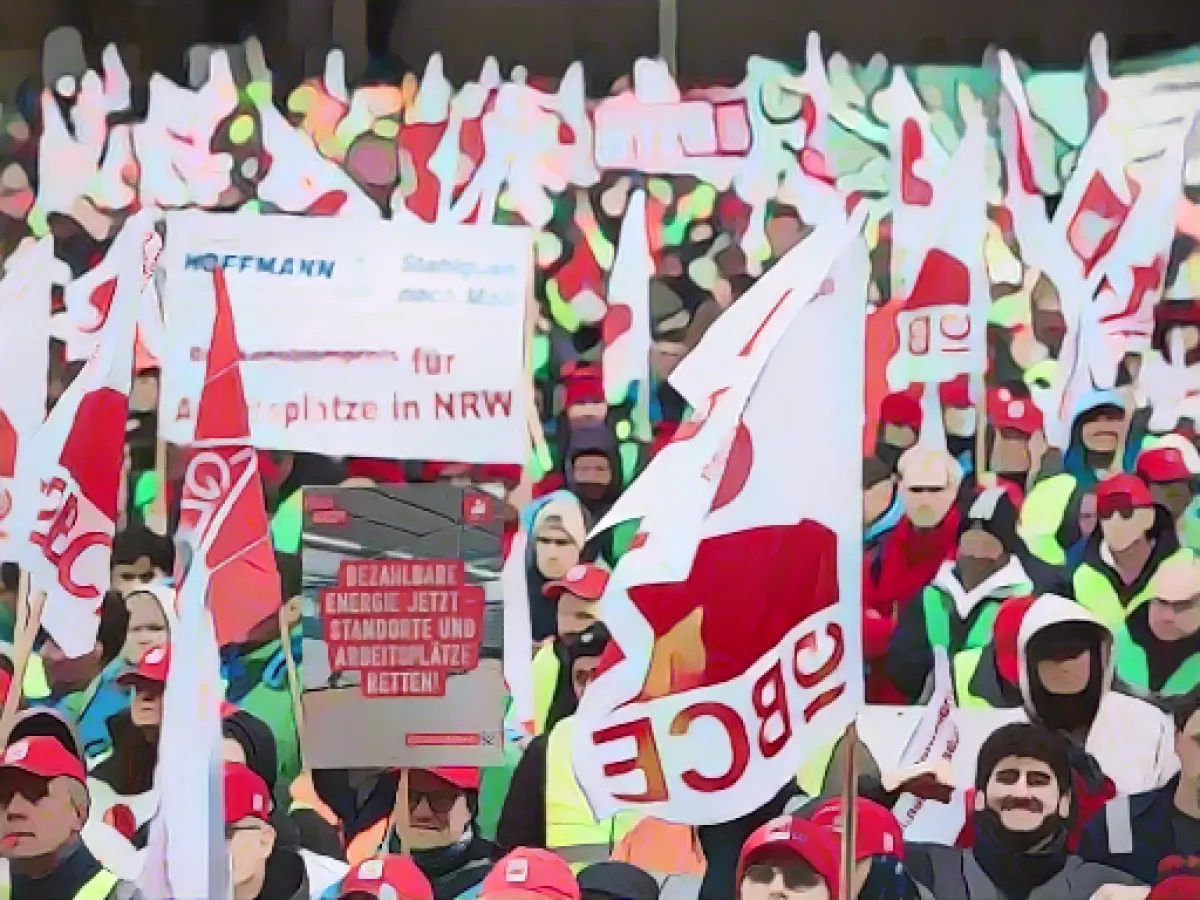Thousands of employees demonstrate for industrial electricity prices
Thousands of employees from the steel, metal and chemical industries have demonstrated for greater relief for energy-intensive companies on electricity prices.
The trade unions IG Metall and IG BCE had called for a nationwide "day of action". Under the slogan "Bridge electricity price now", they called on the federal government to cap the electricity price for the affected companies at five cents per kilowatt hour for a limited period of time. Otherwise, there was a threat of job losses and a relocation of production. The trade unions consider the electricity price package presented two weeks ago by the traffic light coalition to be inadequate.
According to IG Metall, around 10,000 people took part in a demonstration in front of the Thyssenkrupp steelworks in Duisburg. In Berlin, around 2000 employees gathered in front of the Federal Ministry of Finance. There were also rallies in Gröditz in Saxony and Kehl in Baden-Württemberg.
"Energy-intensive industry needs green electricity at competitive prices for the transformation," said IG BCE boss Michael Vassiliadis in Duisburg. This has not changed even after the Karlsruhe ruling. "Politicians must be honest across party lines: The climate-friendly restructuring of our economy cannot be paid for out of petty cash." There needs to be a consensus that investments should be exempt from the debt brake.
"The consequences of the Federal Constitutional Court's ruling on the budget are fatal for a climate-neutral future," said IG Metall Chairwoman Christiane Benner in Duisburg. "Now more than ever, we need a clear signal for a green transition, a clear signal for the future of our industry." Politicians must ensure this immediately. "Employees need clear prospects for the transformation to a green, digital economy." The debt brake must be suspended and reformed.
Criticism from companies too
"The debt brake is a brake on the future," said 2nd IG Metall Chairman Jürgen Kerner in Berlin. The green restructuring of industry is a project of the century on which nothing less than prosperity in Germany depends. "All political forces must now take responsibility and ensure that the transformation is financed."
The demands are supported by affected companies such as the steel manufacturer ArcelorMittal. The group, which has sites in Bremen, Hamburg, Duisburg and Eisenhüttenstadt, has applied for funding for billion-euro transformation projects but, unlike its competitors Thyssenkrupp and Salzgitter, has not yet received a legally secure funding commitment. Managing Director André Körner explained in a press release that the company was concerned that the funding decisions "and thus a perspective for our industrial production in Germany in terms of transformation" were missing. "The actions of politicians - both the government and the opposition - in this way are grossly negligent." There is a risk of damage to Germany as a business location.
- The steel, metal, and chemical industries, heavily reliant on industrial electricity, are urging the federal government to cap electricity prices for energy-intensive companies at five cents per kilowatt hour.
- Trade unions IG Metall and IG BCE, citing threats of job losses and production relocation, argue that the electricity price package presented by the traffic light coalition is insufficient.
- The steel manufacturer ArcelorMittal, with sites in multiple German cities, has joined the chorus of criticism, expressing concern over missing financial commitments for its billion-euro transformation projects.
- Michael Vassiliadis, IG BCE boss, underlined the need for green electricity at competitive prices for the transformation of the industry, emphasizing that politicians must agree on exemptions from the debt brake for necessary investments.
- The high industrial electricity prices, following the Karlsruhe ruling, have sparked concerns in the steel and metal industries, with IG Metall Chairwoman Christiane Benner urging politicians to immediately provide clear signals for a green transition and future of the industry.
Source: www.dpa.com








